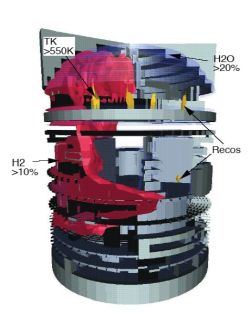Radiolytic Gas Management in Boiling Water Reactors
|
|
Dr.-Ing. Thomas Jordan, IKET, KIT CN |
|
Course |
015 |
|---|---|
|
Title |
Radiolytic Gas Management in Boiling Water Reactors |
|
Prerequisites |
participation in the course of 007 "design of front end accidents, core melt accidents" |
|
Goal of the course |
prediction of hydrogen behavior in serious accidents in printing and boiling water reactors and appropriate responses |
|
Content |
The course will provide the necessary understanding for the relevant phenomena related to the radiolytic processes in particular in boiling water reactors. The physico-chemical processes of the radiolysis in water are explained in detail. The transport and accumulation processes of the radiolytic gases in the reactor will be discussed and strategies to exclude critical scenarios will be exemplified. Mitigation measures including appropriate measurement techniques and their use to achieve required safety levels will be described. |
|
Lecturer |
Dr.-Ing. Thomas Jordan, IKET, KIT |
|
Schedule |
2018; 9 am to 5 pm daily |
|
Location |
KIT Campus Nord, IKET, Building 419, Room 103 |
Dead line for application: 2018
Application form download
Jordan, Thomas is a mechanical engineer who has worked in the fields of computational fluid dynamics, structural mechanics and coupled electromagnetics at the Forschungszentrum Karlsruhe since 1989. There he received his doctoral degree in 1994. Until 2001 he worked in the fields of plasma physics and continuum damage mechanics. He contributed to the SUF working group (safety and environmental impact of fusion reactors) and co-coordinated the EU fission reactor safety projects RPVSA and LISSAC, and two post-SMiRT conferences on the structural integrity of reactor containments. In 2001 he founded a spin-off company for process optimization in the semiconductor industries. In late 2003 he returned to the Forschungszentrum to coordinate the EC NoE HySafe. Since 2005 he is teaching “Hydrogen Technologies” at the Karlsruher Institut für Technologie KIT and since 2009 he is heading the hydrogen group at the Institute for Nuclear and Energy Technologies.

